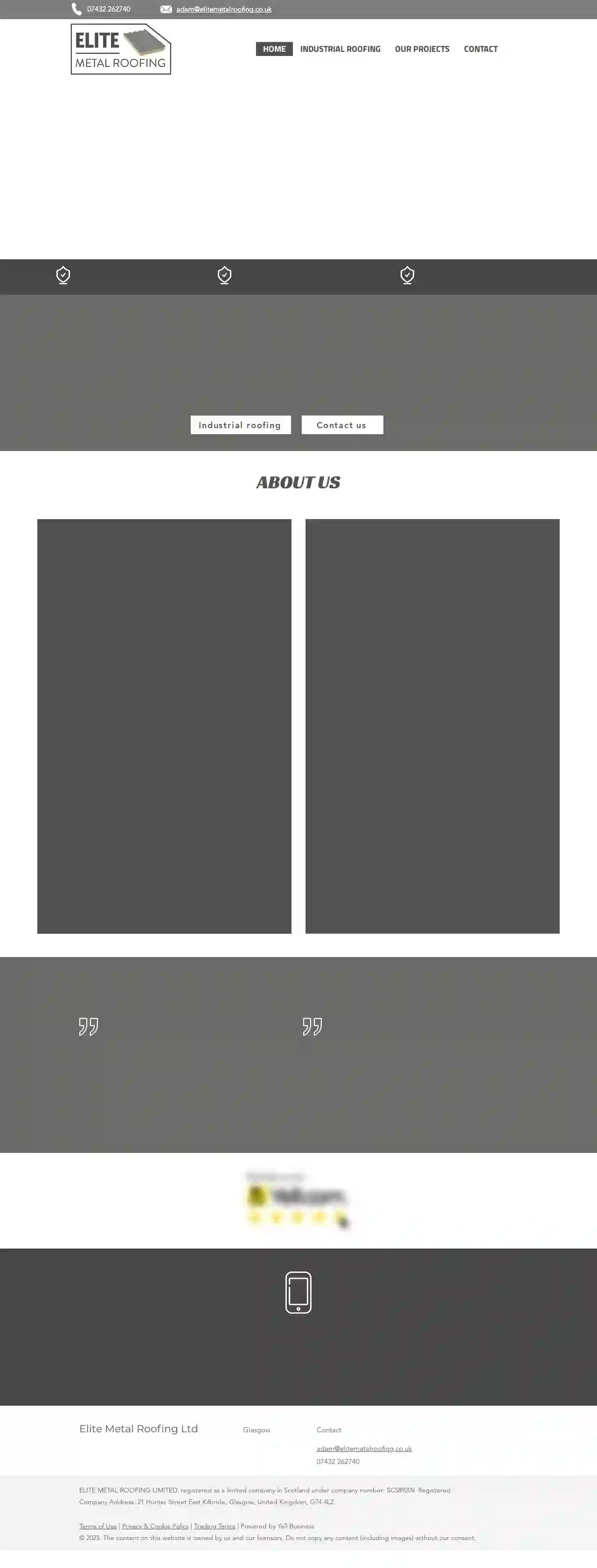Roofing Companies Darvel
Top 10 Roofers in Darvel
Receive up to 3 Roofing Contractor quotes for your project today! Compare profiles, reviews, accreditations, portfolio, etc... and choose the best deal.

Newlife roofing Ltd
3.73 reviewsUnit 1, 10-12 Westburn Road, Aberdeen, AB15 9AA, GBAberdeenshire Roofing Network is a network of trusted roofing professionals serving Aberdeenshire and surrounding areas. We offer a wide range of roofing services for both residential and commercial properties, including roof repairs, flat roofing, pitched roofing, fascias and soffits, and more. Our members are highly skilled and experienced in all aspects of roofing, ensuring that your roof is in safe hands. We understand the importance of a well-built roof, and we are committed to providing our clients with high-quality workmanship and exceptional customer service.
- Services
- Why Us?
- Gallery
Get Quote
Glasgow Roofing Contractors
566 reviews23 Wheatley Loan, Bishopbriggs, G64 1JE, GBRoofing In Glasgow For roofing In Glasgow, Glasgow Roofing, based in Bishopbriggs have 28 years of experience in the roofing trade, much of our work comes from word-of-mouth referrals or repeat customers. Whether you need one slate or tile replaced, or the entire roof, Glasgow Roofing Contractors is at your service. We tailor our general roofing and other roofing services to your specific requirements. Glasgow Roofing Contractors are expert residential (domestic) roofers, who also work on commercial properties. Our roofing services are suitable for listed buildings and conservation areas too.
- Services
- Why Us?
- Gallery
Get Quote
Wren Roofing & Solar
59 reviewsGlasgow, GB- Services
- Why Us?
- Gallery
Get Quote
Pro Clad Roofing Ltd
51 reviewsClarkston Rd, Unit 4, Mineral Yard, Clarkston, G76 8NE, GBPro Clad Roofing is a leading industrial roofing and cladding specialist based in Glasgow, serving clients across Scotland. With decades of experience, we pride ourselves on delivering exceptional service and quality at competitive prices. Our mission is to provide outstanding service to our diverse range of industrial and commercial clients, upholding the highest standards of integrity. We understand that every project is unique, and we take the time to understand our clients' needs from the outset. Our comprehensive range of services includes bespoke design assistance, project management, turnkey solutions, and straightforward contracts. We ensure a seamless process tailored to each client's specific requirements. Beyond project completion, our commitment extends to comprehensive after-sales support, routine maintenance, emergency call-out services, and ongoing inspections. This ensures continued client satisfaction and the longevity of every project we undertake. At Pro Clad Roofing, we believe in building long-term relationships with our customers. We understand that delivering excellence in one project leads to further opportunities, fostering trust and partnership along the way. This approach has allowed us to grow into the reputable company we are today. Choose Pro Clad Roofing for your industrial roofing and cladding needs and experience the difference that expertise, integrity, and unwavering commitment can make to your project.
- Services
- Why Us?
- Gallery
Get Quote
C W Roofing Services
52 reviewsHamilton Road, Unit 1, 100 Hamilton Road, Hamilton, ML11 9AA, GBLanarkshire Roofing Network is a network of trusted roofing professionals serving Lanarkshire and surrounding areas. We offer a comprehensive range of roofing services for both domestic and commercial properties, including roof repairs, flat roofing, pitched roofing, fascias and soffits, and more. Our experienced and qualified members are dedicated to providing high-quality workmanship and exceptional customer service. We understand the importance of a well-built roof and strive to ensure that every project is completed to the highest standards. Whether you need a small repair or a complete roof replacement, Lanarkshire Roofing Network has the expertise and resources to meet your needs. Contact us today for a free quotation and let us help you protect your investment.
- Services
- Why Us?
- Accreditations
- Our Team
- Testimonials
- Gallery
Get Quote
SIG Roofline
51 reviewsGlasgow, GBSIG Roofing is a specialist merchant of roofing products and services, delivering quality service to our valued customers. Established for over 40 years – with branches throughout the UK from Inverness to Plymouth. We have everything you need under one roof. Whatever you need for your roof, with over 100 branches nationwide, SIG Roofing’s got it covered for you. Our friendly, local teams are always ready to share their passion for roofing, expertise, knowledge and impartial advice.
- Services
- Why Us?
- Gallery
Get Quote
WTM services
52 reviewsGBWTM SERVICES is a leading and reputable Roofing and roughcasting Company serving Scotland. Since opening for business, we've taken a comprehensive approach to project management, providing our clients with a wide range of services to cover their needs. We cover all areas of Glasgow, Edinburgh, Dundee and Fife and surrounding areas. We offer expert advice on all things related to roofing, and our team of skilled and experienced roofers has been serving property owners in Glasgow, Edinburgh, Fife and Dundee and surrounding borders for over a decade. Our roofing and roughcasting specialists are knowledgeable and can offer solutions to a variety of roof-related problems, including new roof constructions, roof replacements, roof repairs, flashing repairs, guttering, fascia, and soffit board services and roughcasting. With the rising cost of energy, it is essential to undertake timely roof replacements and repairs to maintain your property's energy efficiency and save on energy bills. At WTM SERVICES, we understand this and offer free expert advice and competitive quotes from our friendly team. We take pride in providing exceptional roofing services while maintaining a price advantage over other roofing companies in Glasgow and beyond. Our 5-star reviews and referrals are a testament to our commitment to our customers. We are dedicated to offering speedy and high-quality solutions to all your roofing and roughcasting problems. As your committed "ROOFERS NEAR ME" service in Glasgow, we understand that roofing problems can be urgent, particularly during periods of adverse weather. Therefore, we aim to provide quick and reliable services.
- Services
- Why Us?
- Gallery
Get Quote
Base Metal Roofing Limited
51 reviewsGlasgow, Unit 3, 3 Siding Lane, G5 0DZ, GBBase Metal Roofing Ltd, a traditional metal roofing specialist, offers a range of services for fully supported hard metal roofing and cladding systems using Zinc, Copper, Greencoat PLX, Aluminium and Lead. With over 30 years of experience, we work alongside architects, main contractors, local builders and private clients in Scotland, North England and beyond. Our team of skilled and experienced tradesmen provide a comprehensive range of services, from planning to completion, ensuring an excellent finished result. We pride ourselves on a high standard of workmanship and customer service, offering our clients an unrivalled and aesthetically pleasing roofing solution that will enhance the qualities of a building design.
- Services
- Why Us?
- Accreditations
- Gallery
Get Quote
Elite Metal Roofing Limited
21 Hunter Street, East Kilbride, G74 4LZ, GBAt Elite Metal Roofing, we pride ourselves on being a reputable and skilled team of professional roofing suppliers and installers. We offer a comprehensive range of services, including flat roof installations, cladding installations, and guttering services. Our team holds Level 2 Diplomas in Roof Sheeting and Cladding, is qualified in Emergency First Aid at Work, and is associated with the International Powered Access Federation. We are committed to providing our clients with peace of mind, knowing they are in capable hands. We understand the importance of a reliable and knowledgeable contractor for projects like new roofing or cladding. From start to finish, we guarantee excellent customer service. We work seven days a week to accommodate your busy schedule and can provide a quote, timescale, and keep you updated every step of the way. We take pride in our high-quality workmanship and ensure all work is completed to the highest standard. If you need advice on the best roofing solution for your property, don't hesitate to contact us. Why Choose Elite Metal Roofing? Competitive Prices Quality Workmanship Bespoke Service We specialize in industrial roof sheeting and cladding services, with experience working on numerous warehouses and factories. Our services include: Industrial roof sheeting Wall cladding Single ply roofing Site assembled built up metal systems Standing seam roofing Composite panel roofing and cladding Flat to pitched roof conversions Flat roofing Steel roofing Gutter repairs and cleaning Roof repairs and maintenance, including storm damage Insurance work If you don't see what you need, please contact us to discuss your specific requirements. Testimonials "I used Elite Metal Roofing to undertake recent re-roofing works to our industrial unit. Great workmanship and very easy to deal with!" Dayna H. Yell Review "Fantastic service from David who replaced all the old gutters and downpipes. Most helpful service. Much appreciated, I will definitely use Elite Metal Roofing again. I highly recommend them!" Ellen M. Yell Review
- Services
- Why Us?
- Accreditations
- Our Team
- Testimonials
- Gallery
Get Quote
R Young Roofing
53 reviewsChryston, G67 1AA, GBLanarkshire Roofing Network is a network of trusted roofing professionals serving Lanarkshire and surrounding areas. We offer a comprehensive range of roofing services for both domestic and commercial properties, including roof repairs, flat roofing, pitched roofing, fascias and soffits, and more. Our members are highly skilled and experienced in all aspects of roofing, ensuring quality workmanship and customer satisfaction. We understand the importance of a well-built roof, and we are committed to providing reliable and durable solutions to protect your property. Whether you need a small repair or a complete roof replacement, our team can help. Contact us today for a free quotation and let us take care of your roofing needs.
- Services
- Why Us?
- Accreditations
- Our Team
- Testimonials
- Gallery
Get Quote
Over 12,314+ Roofing Businesses registered
Our roofing pros operate in Darvel and surroundings!
Roofyng.co.uk has curated and vetted Top Roofing Businesses near Darvel. Find a reliable business today.
Frequently Asked Questions About Roofing Companies
- Home Improvement Loans: Offered by banks or credit unions.
- Home Equity Loans or Lines of Credit: Use your home's equity as collateral.
- Government Programs: Check for energy efficiency rebates or grants.
- Contractor Financing: Some roofing companies offer financing plans.
- Roof size and complexity
- Roofing material chosen
- Local labor costs
- Accessibility of the roof
- Removal of existing roofing
- Additional features (skylights, chimneys, etc.)
- Leaks or Water Stains: Water stains on ceilings or walls, dripping water, or dampness in the attic.
- Missing, Cracked, or Curled Shingles: Inspect for damaged or missing shingles, especially after a storm.
- Damaged Flashing: Look for rust, corrosion, or gaps in flashing around chimneys, vents, or skylights.
- Sagging or Uneven Rooflines: A sagging roof could indicate structural problems.
- Granule Loss: Excessive granules in gutters suggest aging asphalt shingles.
- Moss or Algae Growth: Can trap moisture and damage roofing materials.
- Sagging or Pulling Away: Gutters that are sagging, pulling away from the house, or visibly damaged need repairs or replacement.
- Overflowing Water: If water overflows during rain, it indicates clogs or inadequate drainage.
- Visible Debris: Leaves, twigs, and other debris accumulated in the gutters obstruct water flow.
- Water Damage: Water stains or damage to siding or foundation near the gutters suggest overflow.
- Plant Growth: Plants or moss growing in the gutters indicate standing water and the need for cleaning.
How can I get financing for a new roof?
How much does a new roof cost in the UK?
What are some common signs of roof damage?
How can I tell if my gutters need to be cleaned or repaired?
How can I get financing for a new roof?
- Home Improvement Loans: Offered by banks or credit unions.
- Home Equity Loans or Lines of Credit: Use your home's equity as collateral.
- Government Programs: Check for energy efficiency rebates or grants.
- Contractor Financing: Some roofing companies offer financing plans.
How much does a new roof cost in the UK?
- Roof size and complexity
- Roofing material chosen
- Local labor costs
- Accessibility of the roof
- Removal of existing roofing
- Additional features (skylights, chimneys, etc.)
What are some common signs of roof damage?
- Leaks or Water Stains: Water stains on ceilings or walls, dripping water, or dampness in the attic.
- Missing, Cracked, or Curled Shingles: Inspect for damaged or missing shingles, especially after a storm.
- Damaged Flashing: Look for rust, corrosion, or gaps in flashing around chimneys, vents, or skylights.
- Sagging or Uneven Rooflines: A sagging roof could indicate structural problems.
- Granule Loss: Excessive granules in gutters suggest aging asphalt shingles.
- Moss or Algae Growth: Can trap moisture and damage roofing materials.
How can I tell if my gutters need to be cleaned or repaired?
- Sagging or Pulling Away: Gutters that are sagging, pulling away from the house, or visibly damaged need repairs or replacement.
- Overflowing Water: If water overflows during rain, it indicates clogs or inadequate drainage.
- Visible Debris: Leaves, twigs, and other debris accumulated in the gutters obstruct water flow.
- Water Damage: Water stains or damage to siding or foundation near the gutters suggest overflow.
- Plant Growth: Plants or moss growing in the gutters indicate standing water and the need for cleaning.